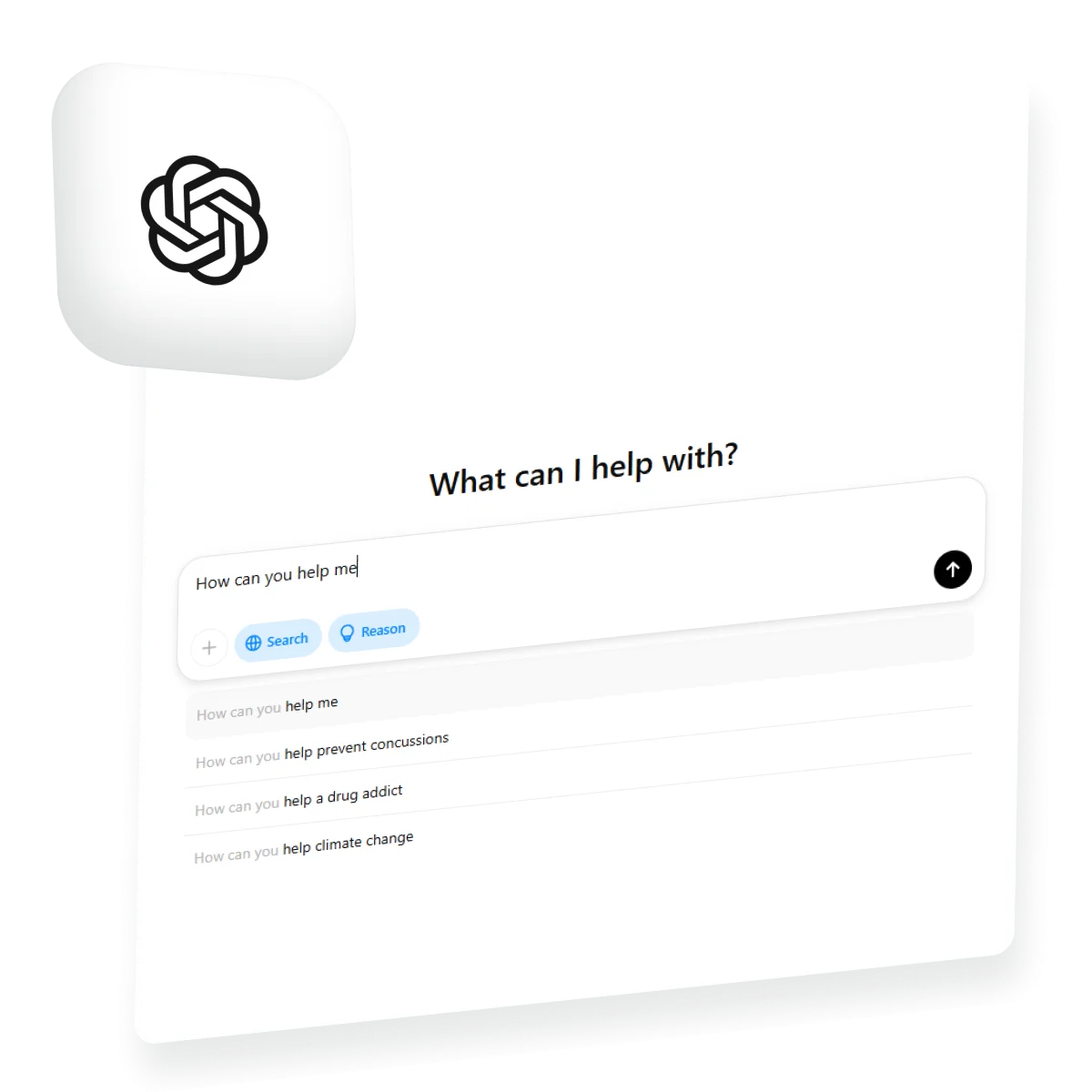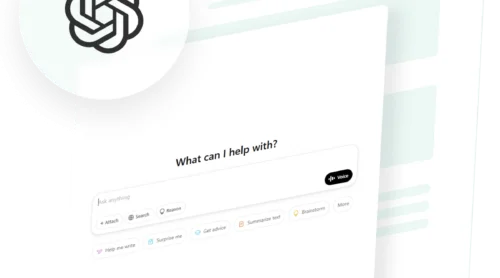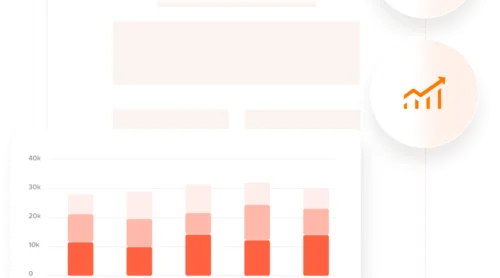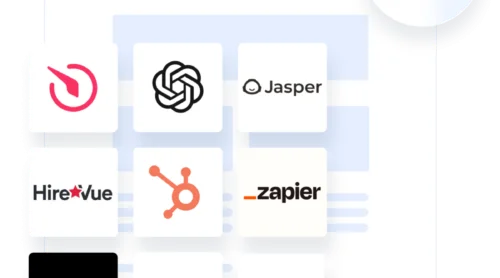What if you could automate routine sales tasks, qualify leads in real-time, and provide instant responses to customer inquiries — all without sacrificing the personal touch? ChatGPT is making this possible. This AI-powered tool is more than just a chatbot. It’s a game-changer for sales teams looking to boost productivity and streamline their workflows. Whether it’s crafting the perfect email or managing follow-up conversations, ChatGPT has the potential to significantly enhance your sales process.
With businesses increasingly relying on AI to stay competitive, the question is no longer “Why should you use ChatGPT for sales?” but rather “How can you best integrate it into your sales strategy?” In this article, we’ll dive into how can ChatGPT improve the sales performance and the best use cases for this AI technology to transform your approach to closing deals and engaging prospects.
Best Use Cases of ChatGPT for Sales
🤖 AI-Powered Sales & Customer Support Chatbots
In a world where customers expect immediate responses, AI-powered chatbots are becoming indispensable in sales. Companies like Sephora and H&M have already harnessed the power of AI to engage customers, answer product inquiries, and drive sales — all without needing a human agent to be available 24/7. ChatGPT takes this to the next level, offering sophisticated, AI-driven customer support that feels personalized and human-like.
How it works:
- Instant engagement: ChatGPT can greet customers, answer common product questions, and even recommend products based on customer preferences.
- Seamless support: Whether a customer has a simple query or needs more detailed assistance, ChatGPT can guide them through the buying process, from product recommendations to checkout, at any time of day.
- Improved conversion rates: With real-time interactions and consistent availability, your chances of closing sales increase significantly. Customers feel valued and supported, which leads to higher satisfaction and more conversions.
💡 Easy Solution: Create your own AI-powered sales chatbot in minutes! With an easy-to-use interface and customizable templates, getting started is quick and hassle-free.
This AI-powered chatbot approach not only saves time and resources but also ensures your business is always ready to serve—boosting both customer experience and sales performance.
With Elfsight, you can design a GPT-driven chatbot that enhances your sales process and customer interactions. Whether you’re new to chatbots or a seasoned pro, Elfsight’s simple setup and flexible features allow you to tailor your chatbot to your specific sales needs.
Increase conversions and improve customer engagement — get started now!
📊 Research and Insights
A successful sales strategy starts with knowing your target market inside and out. ChatGPT can help sales teams conduct research and gain valuable insights without spending hours sifting through data. Whether it’s gathering information on industry trends, understanding buyer personas, or conducting competitive analysis, ChatGPT can quickly process vast amounts of data to provide actionable insights.
How it works:
- Industry research: ChatGPT can analyze trends, news, and reports to provide you with up-to-date information on your industry, helping you stay ahead of competitors.
- Competitive analysis: ChatGPT can summarize competitors’ offerings, pricing strategies, and positioning, giving your team the upper hand when crafting outreach strategies.
- Customer persona development: By analyzing past interactions and browsing habits, ChatGPT can assist in refining buyer personas to ensure that every outreach is targeted and relevant.
By automating research and providing instant insights, ChatGPT frees up your sales team to focus on strategy and relationship-building, giving them the tools to outperform competitors and win more deals.
✍ Content Generation
In sales, communication is key—and content creation plays a huge role in engaging potential customers. Whether you’re writing emails, creating social media posts, or drafting product descriptions, ChatGPT can help you create high-quality content quickly and efficiently.
How it works:
- Sales emails & follow-ups: Crafting personalized, persuasive emails can be time-consuming. With ChatGPT, you can generate tailored emails in minutes, ensuring that each message resonates with the recipient and enhances your chances of closing a deal.
- Social media engagement: ChatGPT can also help your team craft compelling social media posts to engage prospects, from educational content to promotional offers. It can even tailor the messaging based on the target audience, increasing relevance and engagement.
- Consistency in messaging: With ChatGPT, you ensure that your brand’s tone and messaging are always on point, whether you’re sending a cold outreach email or a post about an upcoming product launch.
ChatGPT’s ability to automate content creation doesn’t just save time — it also ensures consistency across all your communication channels, enhancing your brand’s credibility and engagement with prospects.
🎯 Lead Qualification
One of the most time-consuming aspects of sales is qualifying leads — but ChatGPT can help streamline this process. By automating lead qualification, ChatGPT ensures that sales reps can focus their efforts on high-potential prospects, rather than wasting time on leads that aren’t ready to buy.
How it works:
- Automated questioning: ChatGPT can conduct initial conversations with leads, asking questions to determine their interest, budget, and readiness to purchase.
- Filtering leads: By analyzing responses, ChatGPT can quickly categorize leads into hot, warm, or cold, helping sales teams prioritize their outreach and improve conversion rates.
- Instant qualification: ChatGPT can engage leads immediately, qualifying them before your sales team even has a chance to follow up—saving you valuable time.
This intelligent lead qualification process helps sales teams focus on the most promising prospects, accelerating the sales cycle and boosting productivity.
📈 Data Analysis
Sales data is a goldmine of insights, but the challenge is making sense of it all. ChatGPT can make data analysis easier and more accessible by summarizing key insights from CRM records, sales calls, and performance metrics, allowing your sales team to make data-driven decisions faster.
How it works:
- Sales call summaries: ChatGPT can automatically transcribe and summarize sales call notes, extracting key points and follow-up actions to ensure nothing falls through the cracks.
- Identifying successful strategies: By analyzing past sales data, ChatGPT can highlight trends, successful tactics, and areas of improvement—giving your team clear guidance on what’s working and where they can optimize.
- Actionable insights: ChatGPT can provide summaries and reports based on specific queries, helping your team identify strategies that are driving success, without needing to dive deep into raw data.
By automating the data analysis process, ChatGPT helps your sales team stay on top of important metrics and provides them with actionable insights that can lead to better decision-making and improved sales outcomes.
Benefits of Using ChatGPT in Sales
1. Enhanced Productivity through Automation
Sales reps are often bogged down with repetitive tasks, leaving less time to focus on high-value activities like nurturing relationships or closing deals. ChatGPT streamlines these routine tasks, from crafting personalized emails and answering common customer queries to summarizing call notes and generating reports. By automating these processes, your sales team can free up valuable time to engage in activities that drive sales forward.
- Increased efficiency means your team can prioritize relationship-building and deal-closing activities that truly move the needle.
- Sales reps can focus on high-value tasks rather than spending time on administrative work, leading to better outcomes and higher sales performance.
2. Improved Lead Qualification
Not every lead is worth your sales rep’s time. ChatGPT helps you filter and prioritize leads by automating the initial qualification process. It can ask the right questions, evaluate the responses, and automatically identify whether a lead is worth pursuing or not. This ensures that only the most promising leads get handed off to your sales team, improving conversion rates and reducing wasted effort.
- Pre-qualified leads mean less time spent on low-quality prospects and more time engaging with those ready to buy.
- This streamlines the sales funnel, allowing reps to focus on high-potential leads, thereby increasing conversion rates and overall sales efficiency.
3. Personalized Engagement at Scale
Personalization is key in today’s sales environment, but crafting customized messages for each prospect can be time-consuming. ChatGPT’s ability to generate personalized interactions at scale is a game-changer. Whether it’s a follow-up email or a live chat message, ChatGPT analyzes data from past interactions to create messaging that resonates with each individual.
- Personalized communication builds stronger relationships with prospects, increasing the likelihood of conversion.
- The ability to scale personalization without manual effort means you can engage with hundreds or even thousands of prospects, providing each one with a tailored experience.
4. Faster Response Times & Increased Satisfaction
In the digital age, customers expect immediate responses. ChatGPT can instantly answer customer questions, whether they’re about product details, pricing, or shipping, ensuring no lead is left waiting. Faster response times lead to improved customer satisfaction, which directly correlates to higher conversion rates and an enhanced brand reputation.
- Quick responses help customers feel valued and keep them engaged, increasing the chances of closing deals.
- The faster a prospect receives the information they need, the more likely they are to convert, improving overall customer experience and satisfaction.
5. Scalable Customer Support
As your business grows, so do the challenges of maintaining high-quality customer support. ChatGPT can scale your support efforts without sacrificing quality. Whether your sales team is handling dozens or thousands of customer interactions, ChatGPT can engage with multiple customers simultaneously, providing consistent and accurate answers to inquiries.
- Scalable support means you can handle a growing customer base without hiring additional staff, keeping operational costs low while maintaining top-notch service.
- Your sales reps are free to focus on the more complex inquiries, while ChatGPT handles the high-volume routine questions, optimizing team efficiency.
6. Smarter Decision-Making with Data-Driven Insights
ChatGPT doesn’t just handle repetitive tasks. It can analyze sales data and provide actionable insights to help your team make more informed decisions. By analyzing trends, customer behavior, and previous interactions, ChatGPT can uncover patterns that help refine sales strategies and improve performance.
- Data-driven insights provide actionable recommendations that allow your team to adjust strategies in real-time, increasing the likelihood of closing deals.
- With actionable data at your fingertips, your sales team can make smarter decisions, ensuring every interaction is as effective as possible.
7. 24/7 Availability for Global Reach
Your customers don’t operate within the confines of traditional working hours, especially if you’re managing a global audience. ChatGPT offers round-the-clock availability, ensuring that no matter the time zone, your sales team can always engage with prospects, answer questions, and maintain conversations
- Global reach means you can engage with customers at any hour of the day, ensuring your team never misses an opportunity to close a deal.
- 24/7 availability boosts customer satisfaction and creates a seamless experience for prospects across different time zones, making your sales efforts more efficient and consistent.
8. Reducing Human Error & Ensuring Consistency
In sales, even small mistakes can have a big impact. ChatGPT helps reduce human error by providing consistent, accurate responses every time. Whether it’s following up on a lead, answering product questions, or sending out proposals, ChatGPT ensures that every piece of communication remains uniform and error-free.
- Consistency in communication builds trust with prospects and customers, enhancing your team’s credibility and professionalism.
- By eliminating human error in routine tasks, ChatGPT ensures that every communication is clear, on-brand, and mistake-free.
By harnessing ChatGPT’s power, sales teams can unlock new levels of efficiency, personalization, and intelligence. From automating routine tasks to enabling smarter decision-making and scaling customer support, ChatGPT is more than just a tool — it’s a sales game changer.
Practices for Implementing ChatGPT
To maximize the impact of ChatGPT on your sales process, it’s crucial to understand and implement a set of best practices. Here are three key areas to focus on to ensure smooth integration and optimal results with ChatGPT:
Crafting Effective Prompts
The core strength of ChatGPT lies in how you prompt it. The AI can generate more accurate and useful responses if given specific, clear, and detailed instructions. Crafting the right prompts will save time and increase the quality of the output you receive.
Here are some best practices for creating effective prompts:
- Be Specific: The more details you provide, the more context ChatGPT has to generate tailored responses. For example, instead of asking “What’s a good subject line for a sales email?” specify the audience, goal, or tone (e.g., “Suggest a friendly and engaging email subject line for a tech startup targeting small business owners”).
- Use Clear Language: Avoid ambiguity. Clear, unambiguous language helps guide the AI in understanding exactly what you’re looking for, avoiding misinterpretations.
- Provide Context: If possible, include background information, such as the industry or previous interactions with customers, to help ChatGPT generate responses that are more suited to the situation.
By following these strategies, you can significantly enhance the quality of responses ChatGPT generates and streamline your sales processes.
Ethical Considerations
As ChatGPT is used for generating content in sales communications, there are important ethical considerations to keep in mind. Transparency and maintaining trust with your customers are paramount when integrating AI-generated content into your sales workflows.
- Transparency: Let your customers know when they are interacting with AI. This builds trust and aligns with ethical best practices. For instance, if you’re using ChatGPT to send automated email responses or interact via chatbots, informing customers that the communication is AI-generated ensures authenticity.
- Data Privacy: ChatGPT interacts with customer data, so it’s critical to ensure that sensitive information is protected and that your practices comply with data privacy regulations like GDPR or CCPA. Make sure you’re only using customer data for the intended purposes and storing it securely.
- Bias in AI: Be mindful that AI systems, including ChatGPT, can sometimes reflect biases based on the data they’ve been trained on. As you integrate AI into your sales strategy, review the content it generates to ensure it aligns with your company’s values and is free from discriminatory language or biases.
By addressing these ethical factors, you can ensure that your use of ChatGPT is responsible, fostering trust and compliance while avoiding potential pitfalls.
Continuous Learning
ChatGPT is a powerful tool that can become even more effective with continuous updates and learning. Regular interaction with your sales team and feedback loops are key to keeping ChatGPT’s responses relevant and aligned with evolving market needs.
- Update Regularly: Keep ChatGPT informed with up-to-date industry trends, product information, and customer insights. By updating its knowledge base, you ensure that the responses it generates are accurate and current.
- Encourage Feedback: Actively involve your sales team in providing feedback on the outputs generated by ChatGPT. Their hands-on experience with customers allows them to assess the AI’s effectiveness, suggest improvements, and fine-tune responses based on real-world applications.
- Training for Specific Use Cases: Depending on the sales cycle and product, training ChatGPT for specific use cases can enhance its ability to respond appropriately in different contexts. Whether it’s providing customized pitches or creating content for specific customer segments, training ChatGPT to meet your unique needs will yield the best results.
Implementing continuous learning processes guarantees that ChatGPT remains a valuable and evolving tool in your sales toolkit.
By following these best practices, you can fully harness the power of ChatGPT for your sales efforts. These guidelines will help you leverage AI responsibly, enhance productivity, and improve customer interactions, all while staying ahead of the competition.
Best ChatGPT Prompts for Sales
Using the right prompts can make all the difference in how effectively ChatGPT supports your sales efforts. Below are categorized examples of high-performing prompts tailored for various sales use cases.
Lead Generation & Qualification
Finding and qualifying leads is a crucial step in the sales process. ChatGPT can assist by generating targeted outreach messages and pre-qualifying prospects based on their needs.
- Generate a list of 10 qualifying questions to determine whether a prospect is a good fit for our product or service in the industry sector.
- Write an engaging LinkedIn outreach message introducing our product or service to potential clients in the industry space.
- Summarize key pain points that small business owners in the industry face, and suggest how our product or service can address them.
Cold Outreach & Sales Emails
Crafting compelling sales emails can improve response rates and engagement. ChatGPT can help generate persuasive, personalized email templates for different stages of the sales funnel.
- Write a cold email template for reaching out to a prospect who has never heard of our product or service. Keep it concise, value-driven, and friendly.
- Create a follow-up email for a lead who showed interest in our demo but hasn’t responded yet.
- Generate a sales email emphasizing urgency and limited-time offers for our product or service.
Objection Handling & Sales Negotiation
Sales objections are inevitable, and handling them effectively can increase conversions. ChatGPT can provide responses to common objections and negotiation strategies.
- Provide a persuasive response to a prospect who says, ‘Your product is too expensive.’ Offer three variations: cost-benefit, value comparison, and payment flexibility.
- How can I counter the objection: ‘We’re already using a competitor’s solution’ without being too aggressive?
- Suggest a response to a hesitant buyer who needs more time to decide but might be interested.
Social Selling & LinkedIn Engagement
Engaging with prospects on social media platforms like LinkedIn is an essential sales strategy. ChatGPT can help craft posts, comments, and direct messages that build rapport and drive conversions.
- Write a compelling LinkedIn post about the benefits of using our product or service to solve a specific problem in the industry.
- Create a comment to engage a prospect’s recent post about a topic. Keep it insightful and relevant to start a conversation.
- Generate a casual yet professional direct message to a prospect who recently connected with me on LinkedIn.
Personalized Product Pitches & Demos
A well-crafted pitch can determine whether a lead converts. ChatGPT can help tailor product presentations to different audiences.
- Craft a 2-minute pitch for our product or service that highlights the main benefits for the target industry.
- Write a script for a product demo that walks a potential customer through the key features of our solution in a compelling way.
- Summarize how our product compares to a competitor, focusing on unique advantages.
Sales Follow-Ups & Closing Deals
Consistent follow-ups increase the likelihood of closing deals. ChatGPT can help draft engaging messages to keep prospects interested.
- Write a follow-up email for a prospect who attended our webinar but hasn’t responded to our outreach yet.
- Generate a final check-in email for a deal that has been stalled for a few weeks.
- Create a closing email for a customer who has expressed strong interest but hasn’t officially committed.
By using these tailored ChatGPT prompts, sales professionals can streamline outreach, improve engagement, and ultimately close more deals. Adjust these prompts as needed to match your specific sales goals and customer profiles!
Challenges and Limitations
While ChatGPT offers immense potential in streamlining sales processes, it is not a flawless solution. Like any AI tool, it has its limitations, and being aware of them is crucial for using it effectively. Below are some of the biggest challenges sales teams may face when integrating ChatGPT into their workflows, along with strategies to overcome them.
1. Accuracy of Information: AI Is Not Always Right
One of the biggest concerns with ChatGPT is that it doesn’t have real-time access to the latest industry data, customer insights, or market changes. Instead, it generates responses based on patterns in the data it was trained on, which may sometimes lead to incorrect, outdated, or misleading information.
| Why it’s important | How to overcome |
|---|---|
| Relying on inaccurate information can harm credibility and lead to costly business mistakes. | Always verify AI-generated data before sharing it with prospects or making business decisions. |
Misinformation about pricing, product features, or market trends can mislead potential customers. | Cross-check information with up-to-date sources, such as company databases, official websites, or recent reports. |
| AI-generated competitor insights may be incomplete or outdated, affecting strategic decisions. | Use ChatGPT for idea generation but validate critical insights with human expertise. |
2. Lack of Emotional Intelligence: AI Can’t Replace Human Connection
Sales isn’t just about presenting facts — it’s about building trust, handling objections with empathy, and understanding customer emotions. While ChatGPT can simulate polite and engaging conversations, it lacks true emotional intelligence and cannot fully grasp the subtle nuances of human interactions.
| Why it’s important | How to overcome |
|---|---|
| Sales reps often rely on emotional cues to gauge a prospect’s interest or hesitation — something AI can’t do. | Use ChatGPT for initial outreach and repetitive tasks, but let human reps handle complex interactions. |
AI-generated responses may come across as overly robotic or generic if not carefully crafted. | Personalize AI-generated responses to ensure they sound natural and customer-focused. |
| In high-stakes sales situations, customers may prefer human interaction over AI-driven communication. | Train your team to recognize when AI should step back and a human touch is needed. |
3. Dependence on Quality Input: Garbage In, Garbage Out
ChatGPT’s effectiveness is only as strong as the quality of the prompts and data it receives. If the input is vague or poorly structured, the output will be generic or irrelevant. This means sales teams must carefully craft their prompts to get the most useful responses.
| Why it’s important | How to overcome |
|---|---|
| Poorly worded prompts can lead to AI-generated responses that don’t align with the sales team’s goals. | Use highly specific and structured prompts to guide ChatGPT’s responses. |
| Without clear guidance, ChatGPT may provide overly broad or unrelated information. | Continuously refine prompts based on past results to improve output quality. |
| Sales teams may waste time reworking AI-generated content instead of streamlining their workflows. | Provide clear context in prompts, such as industry, target audience, and sales objectives. |
While ChatGPT can significantly enhance sales efficiency, it is not a standalone solution. Understanding its limitations ensures that businesses can use it strategically rather than blindly relying on it.
By combining AI-driven efficiency with human expertise, sales teams can maximize the benefits of ChatGPT while mitigating its drawbacks. The key is to treat ChatGPT as a powerful assistant rather than a replacement for genuine, human-driven sales interactions.
Conclusion
ChatGPT is transforming the sales landscape by automating tasks, generating insights, and enhancing customer interactions. However, its true power lies in how businesses use it — balancing AI efficiency with human expertise. When leveraged strategically, ChatGPT can streamline workflows, boost productivity, and drive more meaningful customer engagements.
To get the most out of ChatGPT, sales teams should focus on refining prompts, verifying AI-generated information, and knowing when human intervention is necessary. By addressing its limitations and applying best practices, businesses can maximize AI’s potential to support their sales strategies while maintaining the personal touch that builds lasting customer relationships.






